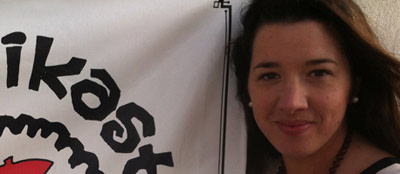basque heritage worldwide

02/26/2013

ADVERTISING
Boise, Idaho. The Boiseko Ikastola was founded 15 years ago, with maintaining the Basque culture as its objective. This center accepts children between the ages of three and six, and Irune is one of the professors. There are more than 8,000 kilometers between Berriz and Boise but new technologies facilitated the interview between Anboto (the Berriz local bulletin) and Irune, at the Boise Ikastola.
-What is your life in Boise like?
Even though it is a city, it isn’t like other capital cities in the US. It has the charm of a smaller town. During the week I work until 4 p.m., and later I usually go play pala once a week: on other days I teach classes at the Basque Museum, and usually go for a walk with my roommates, or go for a drink…
-You were there four years ago and now have decided to return
Yes, I came in 2008 and stayed for 15 months. Afterwards I went to London and in 2012 they asked me if I would like to come back. As my friends from here say, I’m another Basque-American, and I am at home here and know most of the Basques in the area.
-What is the Boise Ikastola like?
It’s called Ikastola, but really it is more like a pre-school. We have children between the ages of three and six. Some Basque parents founded it in 1998, so that their children could be together and maintain the Basque culture. Now we have 21 kids divided between two classes.
-Do they call you Miss Irune?
No! The parents of some of the non-Basque kids do, Miss Irune, but otherwise it is Irune, or the littlest ones call me “teacher.”
-How do the parents and children live in Basque there?
The group from this year and the one a few years ago is very different. In that group, almost everyone spoke Basque because their parents spoke Basque at home. In this year’s group, there are only parents of four children who speak Basque, but they have a hard time speaking it with their children, it’s not easy. I try, but they don’t speak a lot of Basque among themselves…Eman (give), hartu (take), kontuz (be careful), ez egin korrika (don’t run) are some of the expressions that they use the most.
-It is said that the people in the Diaspora are very proud of their roots. Have you noticed that?
If I ask my friends here, none will say that they are only American; they are Basque-American. All know where their families are from and what towns are in the area. They always wear lauburus or Basque tattoos. They name their children Basque names, and so not to lose their second last name, many use those for middle names, for example Parker Arana Anderson or McKenna Kattalin…Basques here are closer to their roots than those in the Basque Country and they fight harder to maintain their language and culture.
To read the entire interview in Basque: www.anboto.org.
ADVERTISING
ADVERTISING
ADVERTISING
ADVERTISING
ADVERTISING
© 2014 - 2019 Basque Heritage Elkartea
Bera Bera 73
20009 Donostia / San Sebastián
Tel: (+34) 943 316170
Email: info@euskalkultura.eus